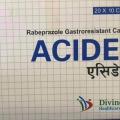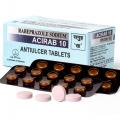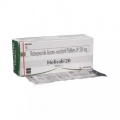Home / Categories / PARIT-20MG

PARIT-20MG
(10X10)
RABEPRAZOLE-20MG
PROTON PUMP INHIBITORS(PPI)
GLAXO SMITHKLINE
Product Details
Rabeprazole Sodium
A to Z Drug Facts
Rabeprazole Sodium
Action
Indications
Contraindications
Route/Dosage
Interactions
Lab Test Interferences
Adverse Reactions
PrecautionsPatient Care Considerations
Administration/Storage
Assessment/Interventions
Patient/Family Education
(ra-BE-pray-zole)AciphexTablets, delayed-release: 20 mgClass: Gastrointestinal, Proton Pump Inhibitor
 Action Suppresses gastric acid secretion by blocking “acid (proton) pump” within gastric parietal cells.
Action Suppresses gastric acid secretion by blocking “acid (proton) pump” within gastric parietal cells.
 Indications Short-term treatment in healing and symptomatic relief of duodenal ulcers and erosive or ulcerative gastroesophageal reflux disease (GERD); maintaining healing and reducing relapse rates of heartburn symptoms in patients with GERD; treatment of daytime and nighttime heartburn and other symptoms associated with GERD; long-term treatment of pathological hypersecretory conditions, including Zollinger-Ellison syndrome in combination with amoxicillin and clarithromycin to eradicate H. pylori .
Indications Short-term treatment in healing and symptomatic relief of duodenal ulcers and erosive or ulcerative gastroesophageal reflux disease (GERD); maintaining healing and reducing relapse rates of heartburn symptoms in patients with GERD; treatment of daytime and nighttime heartburn and other symptoms associated with GERD; long-term treatment of pathological hypersecretory conditions, including Zollinger-Ellison syndrome in combination with amoxicillin and clarithromycin to eradicate H. pylori .
 Contraindications Known hypersensitivity to substituted benzimidazoles.
Contraindications Known hypersensitivity to substituted benzimidazoles.
 Route/Dosage
Route/Dosage
Treatment of Erosive or Ulcerative GERD
Adults: PO 20 mg/day for 4 to 8 wk, an additional 8 wk may be considered for patients who do not heal.
Maintenance of Erosive or Ulcerative GERD
Adults: PO 20 mg/day.
Healing of Duodenal Ulcers
Adults: PO 20 mg/day after the morning meal for 4 wk, additional therapy may be required for some patients.
Treatment of Pathological Hypersecretory Conditions
Adults: PO 60 mg/day. Doses up to 100 mg qd or 60 mg bid have been administered.
H. Pylori Eradication to Reduce Risk of Duodenal Ulcer Recurrence
Adults: PO 20 mg rabeprazole plus amoxicillin 1000 mg plus clarithromycin 500 mg bid for 7 days with morning and evening meals.
 Interactions
Interactions
Drugs dependent on gastric pH for absorption (eg, digoxin, ketoconazole): Plasma levels of digoxin may be increased, while ketoconazole concentrations may be decreased.
 Lab Test Interferences None well documented.
Lab Test Interferences None well documented.
 Adverse Reactions
Adverse Reactions
CARDIOVASCULAR: Hypertension; MI; ECG abnormalities; migraine; syncope; angina pectoris; bundle branch block; palpitation; sinus bradycardia; tachycardia. CNS: Headache; insomnia; anxiety; dizziness; depression; nervousness; somnolence; hypertonia; neuralgia; vertigo; convulsion; extrapyramidal syndrome; hyperkinesias. DERMATOLOGIC: Rash; pruritus; sweating; urticaria; alopecia. EENT: Cataract; amblyopia; glaucoma; dry eyes; abnormal vision; tinnitus; otitis media. GI: Diarrhea; nausea; abdominal pain; vomiting; dyspepsia; flatulence; constipation; dry mouth; eructation; gastroenteritis; rectal hemorrhage; melena; anorexia; mouth ulceration; stomatitis; dysphagia; gingivitis; increased appetite; abnormal stools; proctitis; colitis; esophagitis; glossitis; pancreatitis; cholelithiasis; cholecystitis. GU: Cystitis; urinary frequency; dysmenorrhea; dysuria; kidney calculus; metrorrhagia; polyuria. HEMATOLOGIC: Anemia; ecchymosis; lymphadenopathy; hypochromic anemia. METABOLIC: Hyperthyroidism; hypothyroidism; peripheral edema; edema; weight gain/loss; gout; dehydration. RESPIRATORY: Dyspnea; asthma; epistaxis; laryngitis; hiccough; hyperventilation. OTHER: Asthenia; fever; allergic reaction; chills; malaise; substernal chest pain; neck rigidity; photosensitivity reaction; myalgia; arthritis; leg cramps; bone pain; arthrosis; bursitis.
 Precautions
Precautions
Pregnancy: Category B. Lactation: Undetermined. Children: Safety and efficacy not established. Gastric malignancy: Symptomatic response to rabeprazole does not preclude gastric malignancy.
PATIENT CARE CONSIDERATIONS
 Administration/Storage
Administration/Storage
- Give prescribed dose once daily, at least 1 hr before eating.
- Do not chew, crush, or split. Instruct patient to swallow tablet whole.
- Store tablets at controlled room temperature. Protect from moisture.
 Assessment/Interventions
Assessment/Interventions
- Obtain patient history, including drug history and any known allergies. Note history of liver disease.
- Assess for bloody or coffee ground emesis and black tarry stools.
- Assess for symptoms of esophageal reflux (eg, heart burn, acid regurgitation) or peptic ulcer activity (eg, indigestion, abdominal pain, nausea).
- Monitor patient for CNS, GI, musculoskeletal, and general body side effects. Report to health care provider if noted and significant.
 Patient/Family Education
Patient/Family Education
- Explain name, dose, action, and potential side effects of drug.
- Advise patient to not chew, crush, or split medication; swallow the tablet whole.
- Remind patient to take each dose at least 1 hr before eating.
- Inform patients that antacids may be taken concurrently with rabeprazole.
- Remind patient that rabeprazole is to be taken every day and not “as needed” nor only when symptoms are present.
- Instruct women to notify health care provider if pregnant, planing to become pregnant, or breastfeeding.
- Advise patient to report any of the following events: bloody or coffee ground emesis, black tarry stools, recurrent heart burn, recurrent indigestion or abdominal pain, increasing need for antacid use.
Books@Ovid
Copyright © 2003 Facts and Comparisons
David S. Tatro
A to Z Drug Facts



